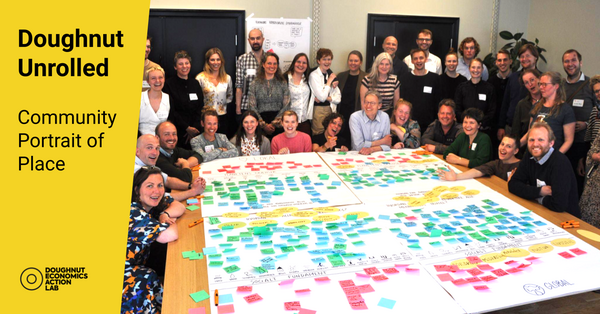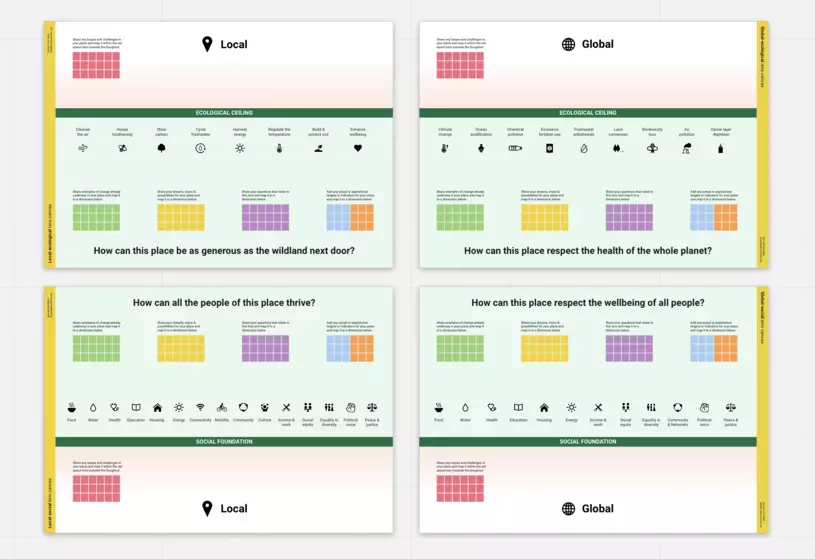
Doughnut Unrolled: Community Portrait of Place
A selection of participatory workshop approaches you can use to explore the four lenses for your place

Version 1.0 (April 2022)
📢 Now translated into French, Spanish, German and Brazilian Portuguese
Overview
The goal of the Doughnut is to meet the needs of all people within the means of the living planet, but what does this mean for the neighbourhoods, cities, districts or nations where we live?
To help you explore this question we've created Doughnut Unrolled, a concept that takes us from the Doughnut to four 'lenses' that invite you to look at the interplay between local aspirations and global responsibilities in your place – both socially and ecologically – and identify possible entry-points for transformative action.
.png)
This tool - Community Portrait of Place - is selection of participatory workshop approaches you can use to explore the four lenses for your place, to create a holistic picture or a 'portrait' of your place's local aspirations and global responsibilities, both socially and ecologically.
- Open the tool in the following languages here:
- Open the Miro canvases in the following languages here:
- All pdf canvases available here
The workshops can be run in-person and online. For the online setting, we've created this set of canvases in Miro (password: fourlenses) that is designed for you to copy, or 'duplicate' into your own Miro account. If you don't have a Miro account, you can create one for free, very easily - that will give you space for three boards. 
Community Portrait of Place is one of five Doughnut Unrolled tools that work together to apply the ideas of Doughnut Economics to your place:
- Introducing the four lenses
- Community Portrait of Place (this tool)
- Data Portrait of Place
- Exploring a topic
- Dimensions of the four lenses
Together they help you create a 'Doughnut Portrait' of your place - a holistic picture with diverse inputs and perspectives - that can act as a starting point for transformative action.
.png)
Whilst we are launching these tools in English we are also kicking off a process for translating all 5 tools into some languages and we will share more details of this in the following weeks.
Why use it?
Community Portrait of Place enables you to build up a holistic perspective of all the qualitative aspects of what it means for your place to thrive and to help bring humanity into the Doughnut.
It invites the people of your place to share their knowledge, ideas, experience and aspirations, to build a rich picture, or 'portrait' of your place, that can keep evolving as more voices contribute, and as knowledge, ideas, experience and aspirations changes over time.
It beautifully complements the Data Portrait of Place approach, that invites you to build up a holistic picture of the quantifiable aspects of what it means for your place to thrive and to help bring humanity into the Doughnut.
So we invite you to explore both these approaches - Data Portrait of Place and Community Portrait of Place - to build a rich and holistic portrait of your place, that draws upon both data and the many and various contributions from the people of your place.
Who is it for?
This tool is for anyone who wishes to explore what the ideas of Doughnut Economics means for them in their place.
Important note: If you wish to use these tools as part of your consultancy or professional advisory services for others, then we require that you follow DEAL's policy for consultancies and professional advisors.
How long does it take?
You can do a quick taster workshop that takes 90 minutes. You can do a half-day or full-day workshop. You can also build up your portrait over time through different methods and with different audiences.
There's a role for all of these approaches, and you might like to start with a quick taster workshop, or a half-day workshop, then think about how you might begin to plan a longer process of building up your portrait over time.
How many people is it for?
For any one workshop, you'll need to think about how many people can meaningfully contribute. This will be dependent on the size of space you have, the number of facilitators you have, and how people will be invited to share their contributions; e.g. if you map all contributions to one large four-lenses canvas, then you will need to keep the number below or around 40, but if everyone is working in smaller groups with their own canvas, then numbers can be larger.
What materials do you need?
You'll need to prepare a canvas, either printed or created in-person, or via Miro if online.
You'll need ways for people to contribute their ideas to the canvas, such as sticky-notes or similar.
What does the facilitator need to know or be able to do?
The facilitator needs to understand the concept of the four lenses, so we recommend you read Introducing the four lenses first.
The facilitator also needs to design the flow of the workshop according to the needs of the group and the intentions you have for the workshop, e.g. to introduce how holistic thinking can be beneficial to connect things and see new opportunities.
In the tool we give some example workshop structures, but there are so many variations that we focused on showing some of the approaches you can take to use in your own workshop design.
Acknowledgements
This tool was created by Rob Shorter, Leonora Grcheva, Kate Raworth and Andrew Fanning of the DEAL Team, in collaboration with Ruurd Priester.
The four lenses builds upon the methodology of Creating City Portraits co-created with Biomimicry 3.8, Circle Economy, and C40 Cities; and the workshop approaches build upon those developed by Civic Square.
We would like to thank the DEAL Community members who reviewed and tested this tool and offered feedback that helped in its development, including Mat Siffels of Amsterdam Donut Coalition, Ilektra Kouloumpi of Circle Economy, Jonas Boothe of Next Economy Lab (NELA) and Roisin Markham of Irish Doughnut Economics Network (IDEN). For anyone we’ve missed, thank you, and do let us know so we can acknowledge your contribution here.
We would also like to thank Iconmonster for the icons used.
Links
- Open the tool in the following languages here:
- Open the Miro canvases in the following languages here:
- All pdf canvases available here
Feedback
Healthy living systems rely on good feedback loops and we invite your comments, reflections and suggestion from using this tool to help us iterate and evolve for future versions.
You can do this two ways:
- The first is to leave a comment in the section below called Join the conversation. The benefit of this approach is that everyone can see and benefit from what you share.
- The second way is to contact the DEAL Team directly via the contact form and choosing the category 'Tools and Stories'.
Share
Share
-
Story

Doughnut in urban development in Grønlikaia, Oslo
A new fjord district in Oslo has been using Doughnut Economics to help guide the urban development.
-
Story

THE DOUGHNUT HERITAGE of the era of coal and steel
Couple words about "ACT! as a Doughnut" project pilot implementation in city of Zabrze in Poland
-
Story

Downscaling the Doughnut to Chapel Hill
As part of a student-led class at UNC-Chapel Hill, students created a model to downscale the doughnut to Chapel Hill.
-
Story

Bielsko-Biała power of local activism
Community portrait of ambitious city in Poland getting familiar with doughnut.
-
Story

Doughnut unrolled for cities during a hackathon
How to experiment emotionally and rationally the doughnut
-
Story

Unrolling the Doughnut: Professionals Community
An story of how a technology community can explore ways to evolve their initiatives
-
Story

Glasgow Engaging Multi-Sector Stakeholders
Glasgow City Portrait workshop with multi-sector stakeholders
-
Story
Workshops with Citizens in Tomelilla, Sweden
Master student explores Doughnut Unrolled tools together with citizens of the municipality to start a Community Portrait
-
Member


Shay Barmand
Noosa, QLD
Studied planetary boundaries and doughnut economics in South Africa, and looking to apply the conceptual framework locally.
-
Member


Zafiq Syaddiq
Ipoh, Malaysia
I am a member of Institut Darul Ridzuan (IDR), which is a state of Perak's Think Thank majoring in sosio-economic.
-
Member


Alexandra Sokol
Los Angeles, CA
I am a Chief Sustainability Officer, Expert Urban Sustainability Solutionist, Polymath & Problem Solver working in X-Risk research and reduction, Disaster Resilience, Urban Adaptation and Sustainable Urban Development, Water & Food Security, Zero Waste & ESG Strategies, and Sustainable Project Development. I am also an Environmental Commission and I work with municipalities on sustainable solutions.
-
Member

John Thorne
Herefordshire
-
Member


Xavier Veciana
Brazil
-Developing circular economy projects in Brasil in private, public and civil society sectors. -Long experience start-ups strategy & financing in private and PPP companies and associations . -Executed projects on systems thinking for learning organizations, community development, urban and coast sustainable development land planning, circular economy entertainment and tourism business. -Field experience in Asia, Africa, Europe and L.America. -Economist, researcher, author and community activist.
-
Member


Sarah Gautschoux
Chambéry, France
-
Member

.jpg)
Jaqueline Vasconcellos
Paris
-
Member

Sanjiv Shrivastava
